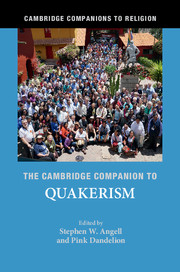Book contents
- The Cambridge Companion to Quakerism
- Cambridge Companions to Religion
- The Cambridge Companion to Quakerism
- Copyright page
- Dedication
- Contents
- Contributors
- Introduction
- Part I History of Quaker Faith and Practice
- Part II Expressions of Quaker Faith
- 4 Literature
- 5 Social Justice and Sustainability
- 6 Seeking Peace: Quakers Respond to War
- 7 Quakers and Education
- 8 The Changing World of Quaker Material Culture
- Part III Regional Studies
- Part IV Emerging Spiritualities
- References
- Index
- Cambridge Companions to Religion (continued from page ii)
- References
5 - Social Justice and Sustainability
from Part II - Expressions of Quaker Faith
Published online by Cambridge University Press: 06 April 2018
- The Cambridge Companion to Quakerism
- Cambridge Companions to Religion
- The Cambridge Companion to Quakerism
- Copyright page
- Dedication
- Contents
- Contributors
- Introduction
- Part I History of Quaker Faith and Practice
- Part II Expressions of Quaker Faith
- 4 Literature
- 5 Social Justice and Sustainability
- 6 Seeking Peace: Quakers Respond to War
- 7 Quakers and Education
- 8 The Changing World of Quaker Material Culture
- Part III Regional Studies
- Part IV Emerging Spiritualities
- References
- Index
- Cambridge Companions to Religion (continued from page ii)
- References
Summary
- Type
- Chapter
- Information
- The Cambridge Companion to Quakerism , pp. 88 - 105Publisher: Cambridge University PressPrint publication year: 2018
References
Suggested Further Reading
- 2
- Cited by

